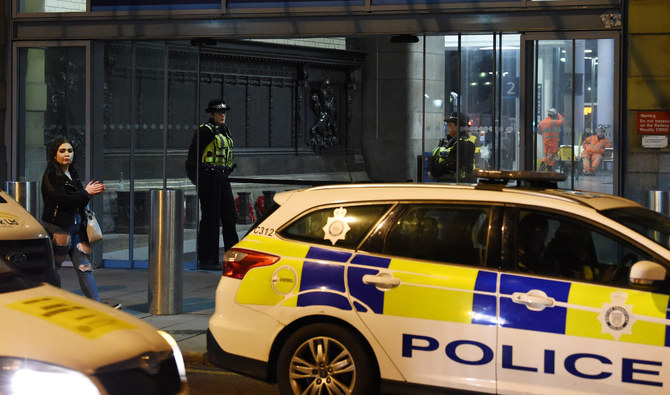LONDON: British police arrested three men under terrorism laws Sunday after a car exploded outside a hospital in Liverpool, killing one man and injuring another.
Counter-terrorism police said the three men, whose ages ranged from 21 to 29, were detained in the Kensington area of the northwest England city under the Terrorism Act.
Police also cordoned off another residential street in the city. They did not disclose details of the operation.
Police were called to reports of a blast involving a taxi at Liverpool Women’s Hospital on Sunday morning. Photos showed a vehicle in flames near the hospital’s main entrance.
Merseyside Police said in a statement that the vehicle, a taxi, “pulled up at the hospital shortly before the explosion occurred. Work is still going on to establish what has happened and could take some time before we are in a position to confirm anything.”
The male passenger of the car died and the driver was being treated for non life-threatening injuries, police said.
The explosion occurred just before 11 a.m. on Remembrance Sunday, the time people across Britain pause in memory of those killed in wars.
Police said the explosion had not been declared a terrorist attack and they were keeping an open mind about the cause, but counter-terrorism police were leading the investigation.
Britain’s interior minister, Home Secretary Priti Patel, said she was “being kept regularly updated on the awful incident.”
The Liverpool Women’s Hospital said it immediately restricted visiting access until further notice and diverted patients to other hospitals “where possible.”
Fire services said they extinguished the car fire rapidly, and a person had left the car before the fire “developed to the extent that it did.”


UK: 3 arrested over car explosion outside Liverpool hospital
Short Url
https://arab.news/vrjeh
UK: 3 arrested over car explosion outside Liverpool hospital

- The male passenger of the car died and the driver was being treated for non life-threatening injuries, police said
Harry Styles announces first album in 4 years, ‘Kiss All the Time. Disco, Occasionally’
- It follows the critically acclaimed synth pop “Harry’s House,” which earned the former One Direction star album of the year at the 2023 Grammy Awards
- “Kiss All the Time. Disco, Occasionally” will contain 12 tracks and is executive produced by Kid Harpoon
NEW YORK: In this world, it’s just him: Harry Styles has announced that his long-awaited, fourth studio album will arrive this spring.
Titled “Kiss All the Time. Disco, Occasionally” and out March 6, the album is Styles’ first full-length project in four years. It follows the 2022, critically acclaimed synth pop record “Harry’s House,” which earned the former One Direction star the top prize of album of the year at the 2023 Grammy Awards.
In a review, The Associated Press celebrated “Harry’s House” for showcasing “a breadth of style that matches the album’s emotional range.”
On Instagram, Styles’ shared the cover artwork for “Kiss All the Time. Disco, Occasionally,” which features the 31-year-old artist in a T-shirt and jeans at night, standing underneath a shimmering disco ball hung outside.
According to a press release, “Kiss All the Time. Disco, Occasionally” will contain 12 tracks and is executive produced by Kid Harpoon. The British songwriter and producer has been a close collaborator of Styles’ since the beginning of his solo career, working on all of his albums since the singer’s 2017 self-titled debut.
“Kiss All the Time. Disco, Occasionally” is now available for preorder.
It is also Styles’ first project since his former One Direction bandmate Liam Payne died in 2024 after falling from a hotel balcony in Argentina.
Titled “Kiss All the Time. Disco, Occasionally” and out March 6, the album is Styles’ first full-length project in four years. It follows the 2022, critically acclaimed synth pop record “Harry’s House,” which earned the former One Direction star the top prize of album of the year at the 2023 Grammy Awards.
In a review, The Associated Press celebrated “Harry’s House” for showcasing “a breadth of style that matches the album’s emotional range.”
On Instagram, Styles’ shared the cover artwork for “Kiss All the Time. Disco, Occasionally,” which features the 31-year-old artist in a T-shirt and jeans at night, standing underneath a shimmering disco ball hung outside.
According to a press release, “Kiss All the Time. Disco, Occasionally” will contain 12 tracks and is executive produced by Kid Harpoon. The British songwriter and producer has been a close collaborator of Styles’ since the beginning of his solo career, working on all of his albums since the singer’s 2017 self-titled debut.
“Kiss All the Time. Disco, Occasionally” is now available for preorder.
It is also Styles’ first project since his former One Direction bandmate Liam Payne died in 2024 after falling from a hotel balcony in Argentina.
© 2026 SAUDI RESEARCH & PUBLISHING COMPANY, All Rights Reserved And subject to Terms of Use Agreement.












